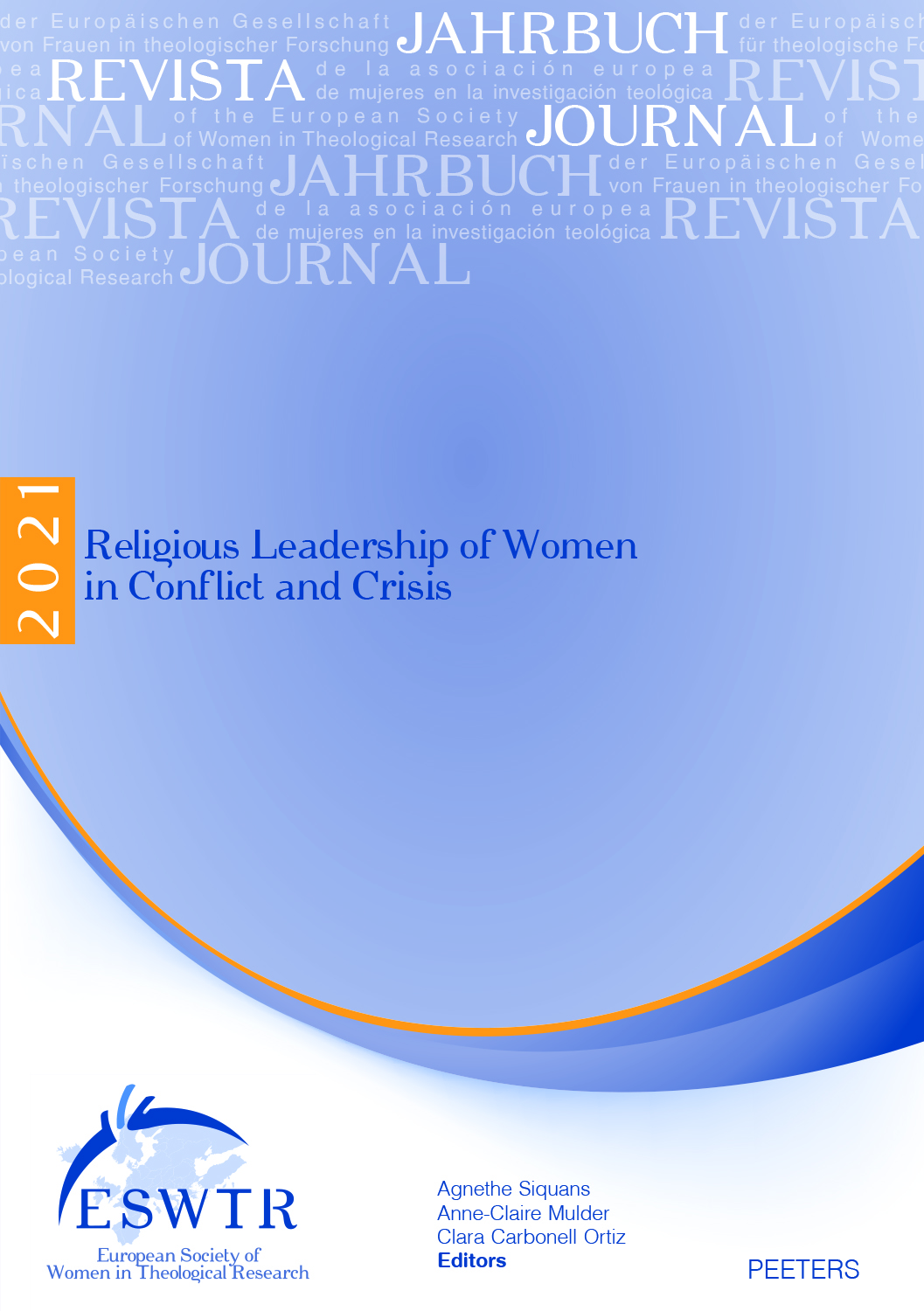 previous article in this issue previous article in this issue | next article in this issue  |

Preview first page |
Document Details : Title: Rechtspopulistische und rechtsextreme Tendenzen im christlichen Glaubensspektrum als relevantes Thema für feministische Theologie und Praxis Author(s): STRUBE, Sonja Angelika Journal: Journal of the European Society of Women in Theological Research Volume: 27 Date: 2019 Pages: 263-278 DOI: 10.2143/ESWTR.27.0.3286564 Abstract : Im vorliegenden Aufsatz werden zunächst unterschiedlich gelagerte Beispiele für Berührungspunkte und Zusammenarbeiten zwischen politisch rechten und rechtsextremen und sich christlich verstehenden Gruppierungen anhand der Analyse von Internetseiten vorgestellt. Sowohl Medien der Neuen Rechten (französisch: Nouvelle Droite; englisch: New Right) als auch rechtspopulistische und sogar rechtsextreme Gruppierungen gehen auf konservativ christliche Menschen zu, um dadurch gesellschaftliche Akzeptanz zu gewinnen. Umgekehrt gibt es Personen, Gruppen und (Internet-)Medien christlichen Ursprungs, die gerade aufgrund ihres Glaubens (meist fundamentalistischer Ausprägung) bewusst mit Medien der Neuen Rechten journalistisch zusammenarbeiten bzw. für sie werben (vgl. z.B. die privaten Internetseite www.kath.net, die Internetseite der Deutschen Evangelischen Allianz www.ead.de und die der Evangelischen Allianz nahestehende Nachrichtenredaktion idea). Schließlich gibt es auch Internetseiten, die sich selbst 'christlich'/'katholisch' nennen und zugleich explizit rechtsextreme Inhalte und Positionen vertreten (z.B. die inzwischen abgeschaltete Website kreuz.net). An ihnen zeigt sich deutlich ein Zusammenhang zwischen rechtsextremen Einstellungen und fundamentalistischen Glaubensformen im christlichen Glaubensspektrum, der von hoher politischer Brisanz ist, zumal in Zeiten zunehmender Gruppenbezogener Menschenfeindlichkeit nicht zuletzt aufgrund einer zunehmenden Ökonomisierung aller Lebensbereiche in einem autoritären Kapitalismus (Wilhelm Heitmeyer). Zwischen politisch rechtsextremen und christlich-fundamentalistischen Einstellungen zeigen sich thematische Gemeinsamkeiten und strukturelle Parallelen, als deren gemeinsamer Nenner sich patriarchale Herrschaft bzw. aggressive Repatriarchalisierung benennen lassen. In this article 'Extremist Right-wing Tendencies in the Christian Faith Spectrum as a Relevant Topic in Feminist-Theological Research and Practice', the author highlights several different examples of points of contact and collaborations among politically right-wing and extremist movements and groups of people seeing themselves as Christians, based on content analysis of websites. On the one hand, the media of the New Right (French: Nouvelle Droite; German: Neue Rechte) and right-wing populist movements, even right-wing extremists, seek conservative Christian individuals in order to gain societal acceptance. On the other hand, people, groups and (web-based) media of Christian origin are willing to collaborate with the New Right media in the field of journalism, to advocate their cause and advertise their products due to reasons that can be chiefly put down to faith (mostly in a fundamentalist form). Examples include the private website kath.net, the Deutsche Evangelische Allianz (German Protestant Alliance) ead.de, and the news service idea.de affiliated to the aforementioned group. In addition, some websites define and label themselves as 'Christian' and/or 'Catholic' and simultaneously endorse explicitly right-wing contents and positions (e.g. kreuz.net, which in the meantime has been shut down). These examples clearly show a connection between right-wing extremist views and fundamentalist forms of belief in the Christian spectrum. This observation is of a highly contentious and politically relevant nature. This is especially true in a climate of increasing group-focused enmity, which is also, to a degree, a result of the ongoing commodification of all domains of life in a superordinate system of authoritarian capitalism (Wilhelm Heitmeyer). Political rightwing extremist and Christian-fundamentalist attitudes share thematic common grounds and structural parallels which can be derived from a common denominator of patriarchal rule and/or aggressive repatriarchalisation. En su artículo 'Tendencias de la extrema derecha en el espectro cristiano de la fe como tema relevante para la práctica e investigación de la teología feminista', la autora amplía el sujeto de estudio mostrando diversos ejemplos de puntos de contacto y colaboraciones entre la derecha política y movimientos extremistas con grupos de personas que se consideran cristianas, según el análisis de páginas web. Tanto los medios de comunicación de la Nueva Derecha (francés: Nouvelle Droite; alemán: Neue Rechte) como movimientos populistas de derechas, e incluso extremismos de derechas, se acercan a individuos cristianos conservadores con el objetivo de conseguir aceptación social. Por otro lado, hay personas, grupos y medios de comunicación (online) de orígenes cristianos que desean colaborar con los medios de comunicación de la Nueva Derecha en el campo del periodismo y defender o promocionar su causa o productos por razones que pueden ser principalmente atribuibles a su fe (lo cual toma una forma fundamentalista). Sirvan como ejemplo la web privada kath.net, la web de la Deutsche Evangelische Allianz (Alianza Evangélica Alemana) ead.de y el nuevo servicio idea.de, afiliado al grupo arriba mencionado. Adicionalmente, hay webs que se definen y etiquetan a sí mismas como 'cristianas' y/o 'católicas', y que apoyan al mismo tiempo contenidos y posicionamientos explícitamente de derechas (por ejemplo, kreuz.net, que ha sido cerrada). Estos ejemplos muestran claramente una conexión entre opiniones de extrema derecha y formas religiosas fundamentalistas dentro del espectro cristiano de la fe. Esta observación tiene una naturaleza altamente contenciosa y políticamente relevante, en especial en un clima en el cual hay cada vez más enemistad colectiva que es, hasta cierto punto, el resultado de una continuada mercantilización de todos los ámbitos de la vida en un sistema superordinado de capitalismo autoritario (Wilhelm Heitmeyer). La extrema derecha y actitudes fundamentalistas cristianas comparten unos mismos temas y tienen estructuras paralelas, que pueden derivarse de un denominador común de dominación patriarcal y/o repatriacalización agresiva. |
 |


